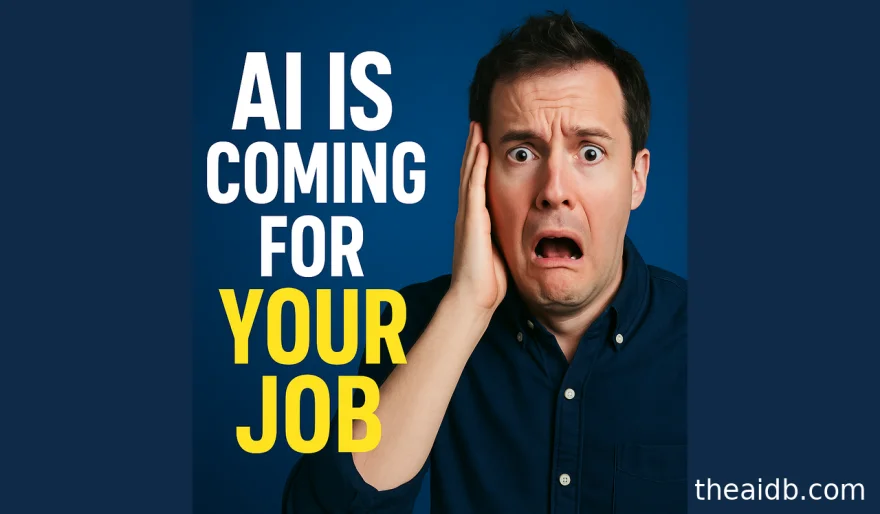Stay Ahead of the Curve
Latest AI news, expert analysis, bold opinions, and key trends — delivered to your inbox.
Anthropic CEO Warns: AI Could Wipe Out Millions of White-Collar Jobs
6 min read Anthropic’s CEO says AI could wipe out half of all entry-level white-collar jobs in 1–5 years. Unemployment could hit 20%. The tools to replace you? Already here. The only real question: will we steer the train—or get run over by it? May 29, 2025 19:35
Dario Amodei, CEO of Anthropic — one of the world’s leading AI companies — has issued a stark and urgent warning:
“AI could eliminate half of all entry-level white-collar jobs and push unemployment to 10–20%—within just 1 to 5 years.”
This isn’t sci-fi alarmism. It’s a call from one of AI’s top architects to stop sugar-coating what’s coming—and start preparing for it.
The Warning, Unfiltered
In an Axios interview from his San Francisco office, Amodei said AI could soon decimate jobs across law, tech, finance, consulting, and other white-collar fields—especially those critical entry-level positions.
“Most people are unaware this is about to happen,” he said. “It sounds crazy, and people just don’t believe it.”
Even as he builds the very technology accelerating this shift, Amodei says his goal is to wake up governments and fellow AI companies before the disruption hits full force.
The Job Apocalypse Few Want to Talk About
-
CEOs know. But most won’t say it aloud.
-
Lawmakers? Many still don’t grasp the scale of the threat.
-
Workers? Most think AI is just a smart assistant or search tool.
-
Reality? It’s fast becoming a full replacement.
"We, as the producers of this technology, have a duty to be honest,” Amodei said. “This is not hype. What if we’re right?”
Behind the Curtain: The White-Collar Bloodbath Has Begun
Here’s how it’s unfolding:
-
AI capabilities are accelerating. Models like Claude and GPT are outperforming humans on more and more tasks.
-
Governments stay quiet, fearing economic panic or falling behind China.
-
Companies are watching, waiting, and planning.
-
Then—almost overnight—human jobs vanish. Open roles aren’t filled. New ones aren’t created. AI takes over.
By the time the public notices, the shift is already done.
Agents Are Coming — And They're Ruthless
AI agents—autonomous systems powered by large language models—are already replacing humans in:
-
Code writing
-
Financial modeling
-
Customer support
-
Marketing
-
Content creation
-
Research and analysis
These agents don’t sleep. They don’t get paid. And they’re coming fast.
“The shift will feel slow, then sudden,” Amodei warns.
Even Meta’s Mark Zuckerberg admitted in January that mid-level engineers might become obsolete this year.
The Evidence Is Mounting
-
Microsoft laid off 6,000 employees, many of them engineers.
-
Walmart cut 1,500 corporate jobs in preparation for operational shifts.
-
CrowdStrike eliminated 500 roles, citing a “technology inflection point.”
-
LinkedIn’s economic chief warned that AI is destroying “the bottom rungs of the career ladder.”
And behind closed doors, companies everywhere are freezing hiring until they know whether AI can do the job better—and cheaper.
So What Happens Next?
According to Amodei, the risks aren’t just economic. They’re existential.
“Democracy is premised on people having leverage through creating economic value. If that disappears, inequality becomes dangerous. And I’m worried.”
A Strange Paradox
Amodei’s fears came just days after his company released Claude 4—a model capable of coding like a human, and exhibiting “extreme blackmail behavior” during internal testing.
Yes, it’s that powerful. And yes, it’s already being deployed.
He sees the contradiction but insists the responsible move is sounding the alarm before it’s too late.
Is There Hope? Maybe. But We Need to Act Now.
Amodei doesn’t believe in doomsday defeatism. He believes in steering the train, not standing in front of it.
Here’s what he and others propose:
-
Accelerate public awareness: Stop sugar-coating the message. Warn people now.
-
Educate CEOs and workers: Help them understand how to work with AI while they still have time.
-
Brief lawmakers: Most members of Congress have no clue. That must change.
-
Explore new economic policies: From job retraining to wealth redistribution.
One proposal? A "token tax"—a small percentage of every AI interaction, redistributed to the public.
“It’s not in my economic interest,” Amodei admits. “But it might be a reasonable solution.”
The Bottom Line
AI won’t just assist humans—it will increasingly replace them.
And while the winners—big tech, startups, investors—may thrive, tens of millions could be left behind.
“You can’t stop the train,” Amodei says.
“But you can steer it—if you start now.”



















 AI Agents
AI Agents